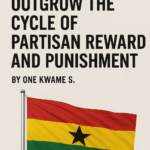
The removal of Chief Justice Gertrude Araba Esaaba Sackey Torkornoo has generated heated debate across the country. While the Constitution allows for the removal of a Chief Justice on grounds of “stated misbehaviour”, the larger concern is not the legal technicalities of this case but the dangerous precedent it sets for Ghana’s democracy.
The perception now is that constitutional offices, once seen as neutral and protected by security of tenure, are increasingly vulnerable to the political winds of the day. If this trend continues unchecked, no Chief Justice, Electoral Commissioner, or similar officeholder can function with genuine independence. Their fate would not be tied to the Constitution but to the tenure of the political authority that appointed them.
Unfortunately, both major political parties have contributed to this cycle. Successive governments have often treated constitutional appointments not as a solemn responsibility to strengthen institutions, but as opportunities to reward loyalty and sideline perceived opponents. In many cases, capable men and women have been forced out, not because they failed in their duties, but because they were not politically aligned with the government of the day.
This pattern has created a climate of insecurity that weakens our institutions. Officeholders often feel compelled to “play safe” with the ruling party rather than serve impartially. The result is a judiciary, an electoral commission, and other constitutional bodies that are less trusted by the public precisely because they are viewed through a partisan lens.
Ghana must break this cycle. Our democracy cannot deepen if competence and capacity continue to be sacrificed on the altar of blind loyalty. The maturity of leadership is measured not by how it rewards its supporters or punishes its opponents, but by how it safeguards the independence of national institutions for the benefit of all citizens.
We must remind ourselves that Ghana does not belong to the NPP or the NDC. It belongs to its people. Leaders must learn to treat Ghanaians as one citizenship, not as rival groups of partisans. If we fail to make this shift, we will remain locked in a destructive pattern where every transition of power brings insecurity, bitterness, and an erosion of trust in public life.
The true strength of our democracy lies not in which party wins power, but in whether our institutions stand strong when political tides shift. It is time for Ghana to grow beyond partisan reward and punishment and to build a culture where loyalty to the Republic is valued above loyalty to a party.